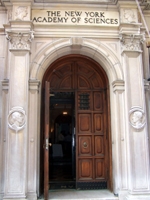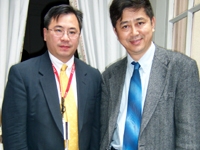Scientists and researchers at Weill Cornell welcomed 39 colleagues from Ithaca at the academic year's second Science Symposium, held on April 19-20. This summit, like the one in Ithaca this past fall, created a forum for researchers to keep their colleagues abreast of projects, foster collaborations, and tap into the synergies abundant among the campus' complementary disciplines.
At the New York Academy of Sciences, a historic townhouse near Central Park, each participant presented a synopsis of research and sought insight, advice and assistance from colleagues in propelling investigations forward. Dr. David Hajjar, dean of the Graduate School of Medical Sciences, announced at the session that the Weill Cornell Board of Overseers has allocated $600,000 for initial funding in a planned $300 million campaign to nurture collaboration across campuses. The symposia are a key component of the campaign's planning. A third symposium, slated for the fall, will continue building on the alliances forged this April.
Dr. Hajjar asked those gathered to think about ways to knit the campuses together over 250 miles of distance for more seamless, integrated collaborations.
"These symposia are designed to support each other, to advance our scientific mission, and to help collaborations flourish," said Dr. Hajjar.
Cornell University's diverse fields of study, cutting-edge facilities and strong commitment to research all create rich, ample opportunities for collaborations. Its nanobiotechnology center, which examines biological systems on a molecular scale, holds major promise for clinical care in its detailed studies of pathogens, cell activity and genetic material. "Nanomedicine is the science of the future," said Dr. Hajjar.

Researchers from Weill Cornell and Ithaca gathered at the historic New York Academy of Sciences, just off Central Park.

Many researchers in distinct fields discovered mutual interests and intersecting lines of research. Rui Hai Liu (right), associate professor of food science in Ithaca, outlined his research of herbal remedies as novel antiviral drugs for hepatitis B and C – an idea that piqued the interest of several attendees, including Dr. Alexis Te (left), associate professor of urology at Weill Cornell.
Dr. Carl Nathan, chairman of microbiology and immunology at Weill Cornell, acknowledged the need for a stronger relationship with chemist colleagues in Ithaca who have the resources of nanobiotechnology. As he studies genes that help regulate the immune response, he'd like to pursue a collaborative project of screening molecular inhibitors
Other areas ripe for synergistic studies are Cornell's veterinary school and divisions of food and plant science, both of which have yielded new insights to address human disease and protect human health. Its computer science experts can help with both data mining and anatomical modeling. Cornell University boasts a "supercomputer," a linked cluster of Intel Pentium III microprocessors, for advanced investigation into an array of medical topics.
Weill Cornell, for its part, has an extensive collection of clinical samples, and practical applications for laboratory breakthroughs.
Presentations touched upon various fields of study, bringing researchers from diverse areas together to discuss their distinct pathways to remarkably common ground.
"These collaborations are a testament to your imagination, scientific expertise and desire to see what can be done across campuses," said Biddy Martin, Cornell University provost.
Dr. Tim McGraw, professor of biochemistry at Weill Cornell, presented his research of cellular activity in type 2 diabetes, tracking glucose activity to help understand the development of insulin resistance in adults. Reaching out to his Ithaca colleagues, Dr. McGraw said, "It's important to establish a dialogue between those who study nutrition, diabetes and obesity as patient diseases, and those who study them on a molecular level. Without this dialogue, we'll never solve these problems."
Photos by Melissa Hantman

